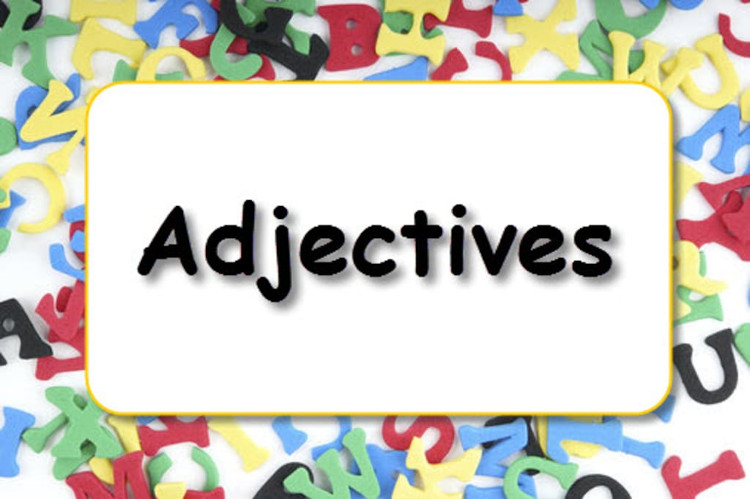Education
Taller Or More Taller: More On Adjectives

The need to always describe persons, places, things and other phenomena has made adjectives an important word class in language studies.
In the semiotics of grammar, nouns are buildings while adjectives are the colours used on them; evidently, the beauty of a building is largely dependent on the choice of colour or colours used. On these grounds, this piece will discuss some common errors noticed among users of English in relation to the use of adjectives. This will serve as an addition to my earlier discussion on adjectives.
Taller Or More Taller: More On Adjectives
The commonest errors with the use of adjectives, especially among second-language users of English, are double comparisons. The double comparison involves the use of inflectional comparison markers (er and est) and lexical comparison markers (more and most) with the same adjectives. Note that regular monosyllabic adjectives such as tall, dark, slim, thin, brief, and irregular monosyllabic adjectives such as good attract the ‘er/est’ inflection. The general reader should take cognisance of the rule which says these adjectives should not attract the ‘more/most’ inflection alongside the ‘er/est’ inflection, as the following sentences indicate:
Your performance was more better than the other man’s (non-standard).
Your performance was better than the other man’s (standard).
He is more taller than his siblings (non-standard).
He is taller than his siblings (standard).
The situation is more worse than what we experienced in the past (non-standard).
The situation is worse than what we experienced in the past (standard).
Ceremonial Or Ceremonious: Clarifying Confusing Adjectives
Keep in mind, though, that ‘much’ can be used alongside comparatives. Hence:
Your performance was much better than the other man’s (standard).
He is much taller than his siblings (standard).
Another common error associated with adjectives is the grading of non-gradable adjectives. Since non-gradable adjectives name absolute or extreme qualities that should not be expressed in degrees, such adjectives include fatal, pregnant, dead, superior, correct, terrible, impossible, inferior, unique (one of its kind), genuine and so forth should not be used in the comparative and superlative senses. What is more, some of them can be used alongside intensifiers like ‘absolutely’, ‘totally’, ‘really’ and ‘completely’, as depicted below:
Your National Identification Number is the most unique in the vicinity (non-standard).
Your National Identification Number is unique (standard).
Your National Identification Number is absolutely unique (standard).
Your answer is very correct (non-standard).
Your answer is totally correct (standard).
The information is very genuine (non-standard).
The information is completely genuine (standard).
Jessica’s mother is more pregnant than I am (non-standard).
Jessica’s mother is pregnant (standard).
The accident was very fatal (non-standard).
The accident was fatal (standard).
- Handsomer Or More Handsome: Comparison Of Adjectives
- Idiomatic Expressions And Their Nigerian Variants
Another grammatical concern is the random ordering of multiple attributive adjectives. When two or more adjectives precede a noun, their arrangement is not arbitrarily done. The arrangement of co-occurring adjectives is given as follows: opinion (brilliant, handsome), size, including height (big, small, tall), age (modern, ancient, young), shape, including weight or length (round, slim, long, heavy), colour (dark, bright, fair, yellow), origin (Nigerian, Italian, German), material (leather, silk, gold), purpose (travelling, gardening, racing) and the noun being described. For example, a person should be described as a handsome tall young slim dark Nigerian guy. While this is taken for granted in many instances of language use, it is a rule to be borne in mind by anyone who wishes to speak or write with the knowledge of established rules.
RECOMMENDED: Handsomer Or More Handsome: Comparison Of Adjectives
Again, it is important to differentiate between determiners and adjectives, as this difference is not emphasised in traditional grammar. While adjectives describe nouns, determiners limit nouns in terms of reference, quantity and possession. The four classes of determiners are articles (a, an, the), demonstratives (this, that, these, those), possessives (my, our, your, her, his, their) and quantifiers (some, few, a few, little, a little, both, many). Note that some of these determiners share similarities with pronouns. The demonstrative determiners, for instance, also function as pronouns when they are not followed by a noun:
This boy is good. (‘This’ is a demonstrative determiner in the context.)
This is good. (‘This’ is a demonstrative pronoun in the context.)
Possessive determiners also appear similar to possessive pronouns, but while the former are always used before nouns, the latter have to be used alone:
My bag is here. (‘My’ is a possessive determiner.)
This bag is mine. (‘Mine’ is a possessive pronoun.)
Many a user of English confuses determiners with adjectives because they both work in relation to nouns, whereas they differ in some clear ways. First, within the structure of a noun phrase, the determiner will always precede the adjective, and the order cannot be distorted.
The tall girl
This quiet student
My new car
RECOMMENDED: Between You And I/Between You And Me: Demystifying The Uses Of Personal Pronouns
Also, adjectives are compared while determiners cannot be compared. So while we can say ‘fine, finer, finest’ and ‘good, better, best’, we cannot say ‘this, thiser, thisest’ ‘both, bother, bothest’ or ‘my, myer, myest’.
Another crucial grammatical information is that demonstrative and possessive determiners do not co-occur within a noun phrase. Instead, the possessive determiner should be changed to a possessive pronoun:
This your bag is fine (non-standard).
This bag of yours is fine (standard).
That their banner has to be removed (non-standard).
That banner of theirs has to be removed (standard).
This piece has touched on some common errors in adjectives that are noticed among second-language users of English. Anyone who hopes to speak the language with finesse must avoid these errors in both spoken and written language.
© 2022 Ganiu Abisoye Bamgbose (Dr GAB)
Department of English,
Lagos State University







